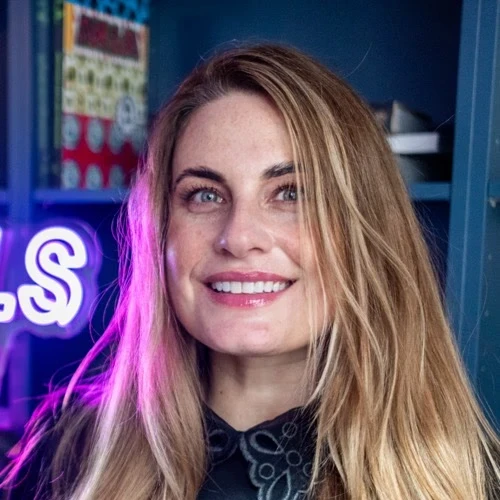Kaitlin Argeaux
CEO of CryptoMondays London
Please introduce yourself and your background. What has brought you into fintech?
My name is Kaitlin, and I’m the Founder and CEO of CryptoMondays London. My journey into the world of crypto wasn’t exactly conventional—I actually began my career as a theatre director! What I’ve always loved about this space is how people come from such diverse backgrounds, and I’m no exception.
Back in 2017, a university friend—my old flatmate who we used to joke was the IT support for the house—introduced me to the world of decentralised identity. He was launching a startup, and as I dug into the concepts of sovereign identity, blockchain, and Bitcoin, I quickly realised this was a dynamic and opportunity-rich industry I couldn’t ignore.
Before I knew it, I’d quit my day job and joined his startup. It was a true startup experience—there were just four of us, and I wore every hat imaginable: marketing, PR, operations, hiring, and beyond. We even ran an ICO during a time when there were no regulations, which made it both exhilarating and chaotic.
That experience gave me a crash course in the crypto industry and solidified my passion for it. These days, in addition to running CryptoMondays London, I work as a marketing and events consultant in the web3 space with Outlier Ventures.
That sounds like a fascinating journey! So, as a woman who came to crypto with no previous background, what challenges did you face?
When I first entered the crypto space in 2017 and 2018, women were few and far between. I often found myself as the only woman at conferences or meet-ups, surrounded by “crypto-bros.” It could be quite intimidating. I didn’t feel comfortable asking questions because I was worried about not being taken seriously or being dismissed for saying something “dumb.”
As I gained more experience and confidence, I started to see the broader, systemic issues at play. Female representation was glaringly absent—there were very few women speaking at conferences, leading companies as CEOs, or holding other positions of authority in the industry. While I’m glad to see progress being made, albeit slowly, there’s still a long way to go.
For instance, at Token2049 Singapore, I was disheartened to see companies still using women's bodies to sell products. It’s a clear reminder that there’s much work to be done to create a truly inclusive and equitable industry.
That is a shame to hear. But you said that the situation is slowly improving. Would you say that the industry has become more inclusive for women?
Yes, things are improving, but there’s still a long way to go. I recently read a report that revealed only 13% of founding teams in crypto are women (BCG X report). That statistic is a stark reminder of the work still needed to achieve true equity.
That said, the Web3 space has offered an incredible opportunity to start fresh and break away from the patterns of Web2. This mindset has been transformative. Women are no longer waiting on the sidelines to be “allowed” to participate—they’re stepping up, founding their own companies, creating women-focused spaces, and funding projects led by women.
The idea that there are enough seats at the table for everyone in Web3 is a powerful one. It’s driving real change and fostering a more inclusive environment.
In your opinion, what else needs to change to further promote gender diversity in crypto?
The key challenge is funding. Female-founded projects need more financial support because this creates a powerful ripple effect. When women-led initiatives are funded, we see more women stepping into leadership roles. With more female founders and CEOs, there’s a greater chance for them to be featured in media, quoted in publications, and take center stage at conferences and events. This kind of representation is crucial—it empowers young women by providing visible role models who show them what’s possible.
But gender inclusivity isn’t just a “women’s issue.” Men have a significant role to play as allies. I’d love to see more men actively stepping up—hiring women into leadership roles, ensuring equal pay, funding female-led projects, and creating spaces where women can thrive. Male allies can also hold one another accountable, helping to foster a culture where equality isn’t just an ideal but a reality.
